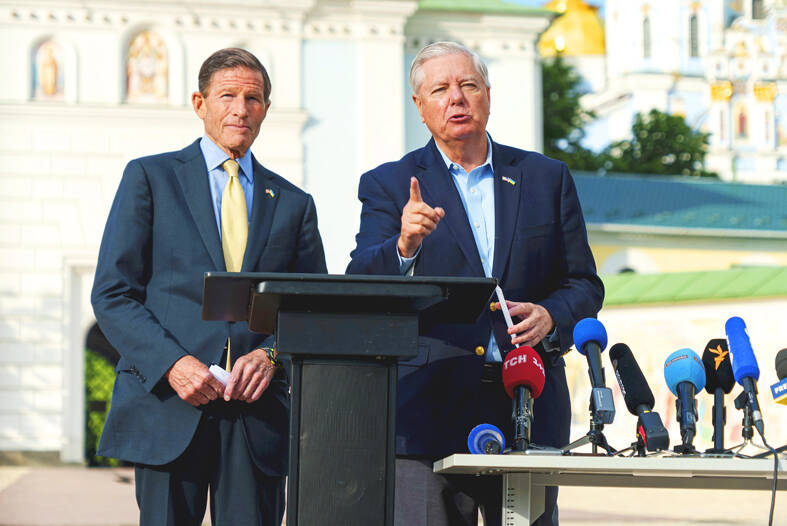The cosponsors of a new US sanctions package targeting Russia on Thursday briefed European allies and Ukraine on the legislation and said the legislation would also have a deterrent effect on China and curb its ambitions regarding Taiwan.
The bill backed by US senators Lindsey Graham and Richard Blumenthal calls for a 500 percent tariff on goods imported from countries that buy Russian oil, gas, uranium and other exports — targeting nations such as China and India, which account for about 70 percent of Russia’s energy trade, the bankroll of much of its war effort.
Graham and Blumenthal told The Associated Press in Rome that they hope to bring the legislation to a vote in the US Senate before the recess begins next month.

Photo: AP
They said they are convinced that it would give US President Donald Trump the tools and flexibility he needs to force Russian President Vladimir Putin to negotiate an end to the war.
“We’re not gonna play whack-a-mole anymore with Russia and sanctions,” Graham said. “We’re going after his [Putin’s] customer base. And that’s what the Europeans, I think, are most pleased with.”
“This is not just kind of a continuation of our current strategy. This is a real turning point,” Blumenthal said. “It’s a real game-changer, because it says to Putin: ‘We’re going to hit you right where it hurts.’”
Graham and Blumenthal briefed a meeting in Rome of the “coalition of the willing,” the 30-plus countries that have said they are prepared to send troops to keep the peace in Ukraine after hostilities cease. The meeting, which the US attended for the first time, was held on the sidelines of a Ukraine recovery conference.
They also said that the legislation would have a deterrent effect on China and curb its ambitions regarding Taiwan.
The threat of such a massive economic hit on Beijing for its support of Russia was a “trial run for Taiwan,” Graham said.
“The other important lesson for China here is that a small country, out-manned and out-gunned, can win,” Blumenthal said.

POSITIVE DEVELOPMENT: Japan and the US are expected to hold in-depth discussions on Taiwan-related issues during the meeting next month, Japanese sources said The holding of a Japan-US leaders’ meeting ahead of US President Donald Trump’s visit to China is positive news for Taiwan, former Japan-Taiwan Exchange Association representative Hiroyasu Izumi said yesterday. After the Liberal Democratic Party’s landslide victory in Japan’s House of Representatives election, Japanese Prime Minister Sanae Takaichi is scheduled to visit the US next month, where she is to meet with Trump ahead of the US president’s planned visit to China from March 31 to April 2 for a meeting with Chinese President Xi Jinping (習近平). Japan and the US are expected to hold in-depth discussions on Taiwan-related issues during the

‘LIKE-MINDED PARTNER’: Tako van Popta said it would be inappropriate to delay signing the deal with Taiwan because of China, adding he would promote the issue Canadian senators have stressed Taiwan’s importance for international trade and expressed enthusiasm for ensuring the Taiwan-Canada trade cooperation framework agreement is implemented this year. Representative to Canada Harry Tseng (曾厚仁) in an interview with the Central News Agency (CNA) said he was increasingly uneasy about Ottawa’s delays in signing the agreement, especially as Ottawa has warmed toward Beijing. There are “no negotiations left. Not only [is it] initialed, we have three versions of the text ready: English, French and Mandarin,” Tseng said. “That tells you how close we are to the final signature.” Tseng said that he hoped Canadian Prime Minister Mark Carney

President William Lai (賴清德) yesterday bestowed one of Taiwan’s highest honors on Saint Vincent and the Grenadines (SVG) Ambassador Andrea Clare Bowman in recognition of her contributions to bilateral ties. “By conferring the Order of Brilliant Star with Grand Cordon on Ambassador Bowman today, I want to sincerely thank her, on behalf of the Taiwanese people, for her outstanding contribution to deepening diplomatic ties between Taiwan and SVG,” Lai said at a ceremony held at the Presidential Office in Taipei. He noted that Bowman became SVG’s first ambassador to Taiwan in 2019 and

A man walks past elementary school artworks at the Taipei Lantern Festival in Ximen District yesterday, the first day of the event. The festival is to run from 5pm to 10pm through March 15.